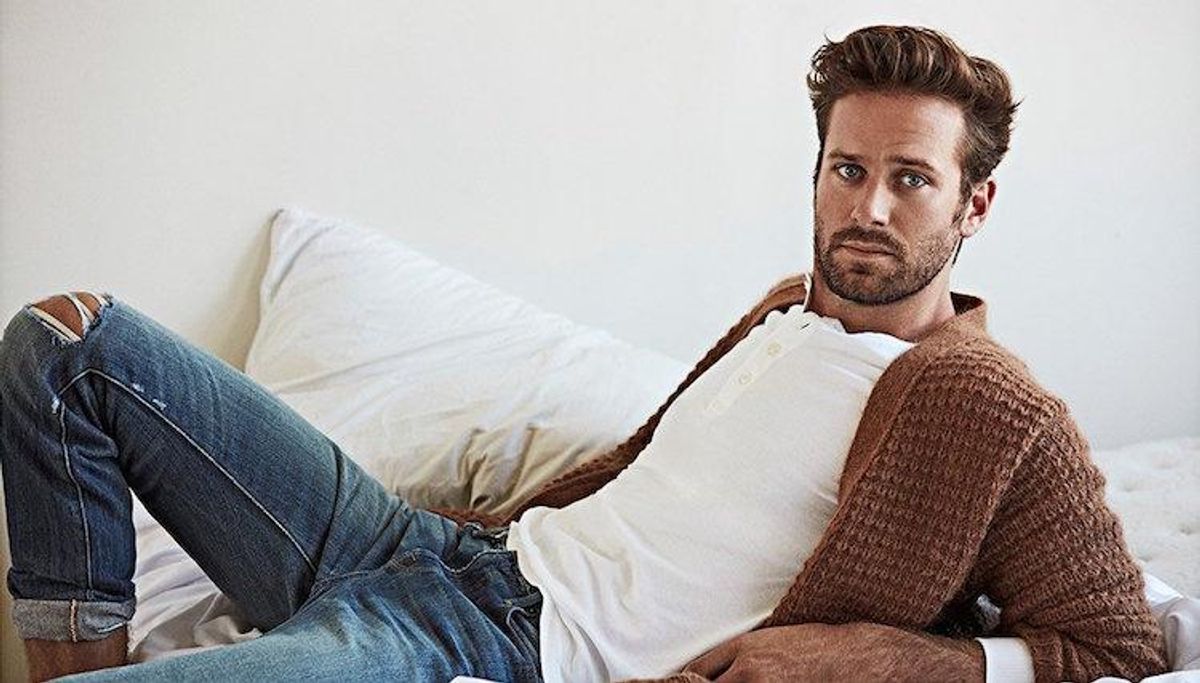Armie Hammer is undeniably hot and, as a tall, handsome, masculine cisgender man, he represents a lot of society's normalized ideals on the surface. Underneath all of that though, the heartthrob who is winning over everyone as Oliver in the new gay coming-of-age drama Call Me by Your Name (we're sure you've heard of it by now) is also an incredibly sensitive person.
It's this sensitivity that caused him to flee Twitter when that dancing scene from Call Me by Your Name went viral because, hey, some people just don't want to be reminded that they're awkward dancers. That's okay. Most people don't want to see themselves dance as it happens, let alone in a video spread across the internet.
This week, Hammer's sensitivity has come under fire though, because of a new piece on Buzzfeed called Ten Long Years of Trying to Make Armie Hammer Happen bemoaning Hollywood's continued attempt to make Armie Hammer happen. The viral piece by cultural critic Anne Helen Petersen made a good point about the industry's decade-long attempt to make someone like Hammer, who gives off a "rich asshole" vibe according to Peterson, a big-name star. Despite a long string of flops, "Hollywood would never give up on a guy that handsome, that tall, that white, with a jaw that square," she explained, before ending with this: "Ultimately, the problem isn't that Armie Hammer was given this many chances to happen. It's that the system that ensured those chances--along with those given to so many other white men--also withholds chances, leeway, and faith from those who need and would benefit from them most."
It's a sentiment that obviously needs to be addressed but to insinuate that Hammer's foray into indie films is a new route to make himself famous is unfair. He's an actor, first and foremost, and when it came to Call Me by Your Name, a European art film by a gay, part Algerian director far removed from the Hollywood system, he has been vocal in his own perceived shortcomings about being able to live up to the emotionally exhausting role of Oliver.
Also, as Hammer explained to OUT earlier this year, it's through these challenging roles that he finds himself at his most passionate. "I think when I started having success in this business, largely as a result of The Social Network, people thought, Big, tall, handsome guy, let's get him in front of a franchise, let's make some big movies!, but it just didn't pan out as everyone thought it would," he said. "That ended up being a blessing in disguise, because I got to consciously shift gears after The Man From U.N.C.L.E. and make these little movies that would push me. I hope this movie will lead to more of the same, and I hope people don't necessarily associate me with the guy who wants to make big movies."
Related | The Art of Seduction: Armie Hammer & the Hottest Movie of the Season
By using Hammer solely as a crutch rather than, say, the seemingly endless supply of white actors named Chris who star in big-budget blockbusters, she created a situation that solely targeted the Call Me by Your Name actor, leading him to once again leave Twitter. Suddenly, with his departure, he was derided and mocked, culminating in one particularly nasty hit piece by Slate writer Heather Schwedel with the cringe-worthy title, Man Up and Reactivate Your Twitter, Armie Hammer.
In the newly viral op-ed, Schwedel goes full toxic masculinity and says that Hammer's decision to focus on his mental health in the wake of what is an aggressively negative article and leave social media for a while makes him less of a man. "He's supposed to be embody some kind of masculine ideal. Don't forget, he's 6'5, 220, and there's two of him. By the looks of him, he has definitely tried that Gaston trick of busting belts with his neck. Is he really this bent out of shape over a little article," she asks. She then goes on to make fun of him for being thin-skinned and leaving social media over the previously mentioned dancing clip and finishes with one more hit against his masculinity, saying: "Fire up Twitter and do what a real man would do: Make a dumb joke that we'll give you more credit for than you deserve because you're just that handsome."
Here's the thing. No actor owes us anything, much less Armie Hammer. He is an actor and the star of one of the biggest indie films of the year, yes, but he's also human. He has feelings and by cutting him down for not living up to the ideals of toxic masculinity that make it so guys are afraid to cry, you're missing the point and creating an ugly, toxic dialogue. It's possible to be handsome, rugged, and sensitive--to have a square jaw and cry. No matter what anyone looks like, their feelings matter and if a movie star--or anyone--needs to take a break from social media to take care of their mental health, they have every right to.
Related | The 2017 Spirit Award Nominations Are a Big Win for Diversity
To put the blame on Hammer for not being "man enough" to handle criticism in a way you deem appropriate is dangerous and reinforces the kind of toxic masculinity that we should be trying to dismantle. There are ways to critique the system of privilege that white, handsome actors like Hammer are part of, but by diverting attention to why Hammer isn't "man enough," articles like the Slate piece take away from the very real argument that Peterson attempted to call attention to in the first place with her own Buzzfeed essay. That is, Hollywood is a factory for producing the kinds of straight, chiseled masculine white men that fill movie screens. Until we confront the inner workings of the industry and hold Hollywood accountable for upholding the straight, white masculine ideals that Hammer is a product of, diversity in films will continue to be an asterisk rather than the status quo.




















































































